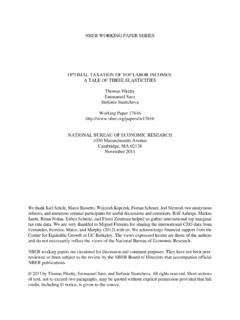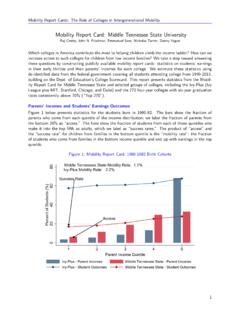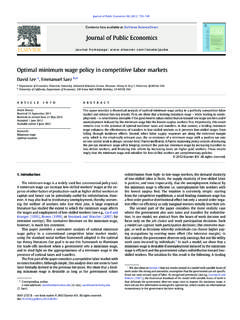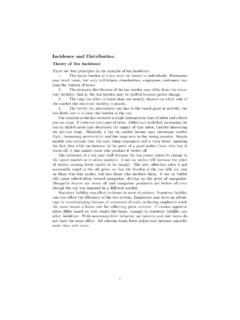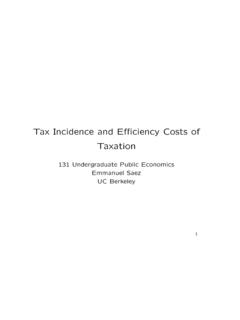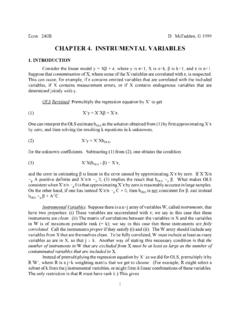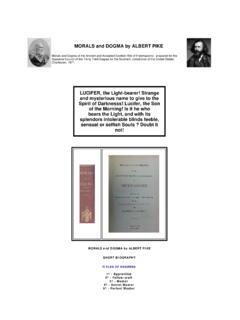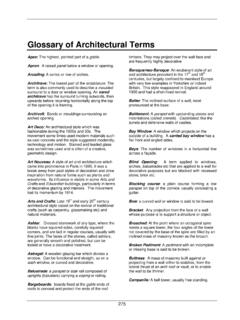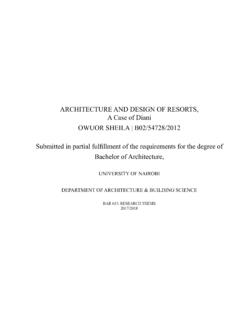Transcription of A Theory of the Origin of the State - University of California, …
1 ~.Landau, Amer. J. Public Health 54, 85 (1964).'~ If one accepted this evidence as conclusive,it would follow that the annual costi of airpollution, because of health effects, would runbetween $14 billion and $29 See J. H. Schulte; Arch. Environ. Health 7,524 (1963); A. G. Cooper, "Carbon Mon-oxide,'," Public Health Serv. Publ. (1966); Effects o/' Chronic Exposure toLow. Levels ot, Carbon Monoxide on HumanHealth, Behavior, and Perjormance (NationalAcademy of Sciences and National Academyof Engineering, Washington; ,, 1969):,66: Another way to estimate the cost of air pollu-tion is to examine the effect of air pollu-tion on property values. See R.
2 J. Anderson,Jr,, and T. D. Crocker, "Air Pollution and' "residential property values," paper presentedat a meeting of the Econometric Society, NewYork, December 1969;, H. O. Nourse, LandEcon. 43, 181~ (1967); R. G. Ridker, Eco-nomic Costs oj' Air, Pollution (Praeger, NewYork, 1967); R. Gl Rldker and! J. A. Hen-ning, Rev. Econ. Statist. 49, 246 (1967); R.,N. S. Harris, G. S. Tolley,, C. Harrell, , 241 (d968):67. P. Buell, J. E. Dunn, Jr., L. Breslow, Cancer20, 2139 (1967).68. E. C. Hammond and D. Horn, l. Amer. 166, 1294 (1958).A Theory of the Originof the StateTraditional theories of State origins are consideredand rejected in favor of a new ecological L.
3 CarneiroFor the first 2 million years of hisexistence, man lived in bands or vil-lages which, as far as we can tell,,were completely autonomous: Not untilperhaps 5000 did' villages beginto aggregate into larger political , once this process of aggregationbegan, it continued at a progressivelyfaster pace and led, around 4000 B:C:,to the formation of the first State inhistory. (When I speak of a State Imean an autonomous politicali unit,encompassing many communities with*in its territory and having a centralizedgovernment with the power to collecttaxes, draft men for work or war, anddecree and enforce laws.)Although it was by all odds the mostfar-reaching political develbpment inhuman history, the Origin of the stateis stilli very imperfectly understoodL In-deed, not one of the current theoriesof the rise of the State is entirely satis-factory.
4 At one point or another, all ofthem, fail. There is one Theory , though,which I believe does provide a con-vincing explanation of how states ! is a Theory which I proposed oncebefore (1), and which I present heremore fully. Before doing so, however,21 AUGUST 1970it' seems desirable to discuss, if onlybriefly, a few of the traditionall theories of the Origin of thestate are relatively modern. Classicalwriters like Aristotle, unfamiliar withother forms of politicali organization,tended to think of the State as "nat-ural," and therefore as not requiringan explanation. However, the age of,exploration, by making, Europeansaware that many peoples throughoutthe world lived, not' in states , but inindependent villages or tribes, madethe State seem less natural, and thusmore in need of the many modern theories of stateorigins that have been proposed, wecan consider only a few.
5 Those witha racial basis, for example, are nowso thoroughly discredited that theyneed not be dealt with here. We canalso reject the belief that the State issan expression of the "genius" of apeople (2),, or that it arose througha "historical accident." Such notionsmake the State appear to be somethingmetaphysical or adventitious, and thusplace it beyond scientific my opinion, the Origin of the statewas neither mysterious nor P. Stocks, "British Empire Cancer Campaign,"supplement to "Cancer in North Wales andLiverpool Region," part 2(Summerfield andDay,, London, 1957).70. G. Dean, Brrt. Med. l. 1, 1506 (1966).71. A. H. Golledge and A. Ji Wicken, 112, 273 (1964).
6 72. W. Haenszel, D. B. Loveland, M. G. Sirken,l: Nat. Cancer lnst, 28, 947 (1962).73. The research discussed in this, article wassupported by a grant from~ Resources for theFuture,, Inc. We thank Morton Corn, AllenKneesec, and John Goldsmith for helpfulcomments. Any opinions and remaining errorsare was not the product of "genius" orthe result, of chance, but the outcomeof a regular and determinate culturalprocess. Moreover, it was not a uniqueevent but a recurring phenomenon: states arose independently in differentplaces and at different times. Wherethe appropriate conditions existed, thestate TheoriesSerious theories of State origins areof t!wo general types: voluntaristic andcoercive.
7 Voluntaristic theories holdthat, at some point in their history,certain peoples spontaneously, ration ally, and voluntarily gave up their in-dividual sovereignties and united withother communities to form a largerpoliticali unit deserving to be called astate. Of such theories the best' knownis the old Social Contract Theory , whichwas associated especially with the nameof Rousseau. We now know that nosuch compact was ever subscribed toby human groups, and! the Social Con-tract Theory is today nothing morethan al historical most widely accepted of modernvoluntaristic theories is the one I callthe "automatic" Theory . According tothis Theory , the invention of agricultureautomatically brought into being a sur-plus of food, enabling some individualfito divorce themselves from food pro-dhction and to become potters, weav-ers, smiths, masons, and so on, thuscreating an extensive division of of this occupationali specializationthere developed a political integrationwhich united a number of previouslyindependent communities into a argument was set forth most fre-quently by the late British archeologistV.
8 Gordon Childe (3).The author is curator of South Americanethnology in the departmentt of anthropologyat the American Museum of Natural History,New York, New : ~ The principal difficulty with thistheory is that agriculture does not au-tomatically create a food surplus. Weknow this because many agricultural'peoples of the world produce no such~surplus. Virtually all Amazonian In-dians, for example, were agriculturai,,but in aboriginal times they did notproduce a food' surplus. That it was:technically feasible for them to pro-duce such a surplus is shown by theifact thaf, under the stimultls of Euro-pean settlers' desire for food, a numberof tribes didl raise manioc in amountswell above their own needs, for thepurpose of trading (4).
9 Thus the tech-nical means for generating a food sur-plus were there; it was the sociali mech-anisms neede& to actualize' it that current voluntaristic theoryof State origins is Karl Wittfogel's "hy-draulic hypothesis:" As I understandhim, Wittfogel sees the State arisingin the following way. In certain, aridand' semiarid areas of'~ the world, wherevillage farmers had to struggle to sup-port themselves by means of small-scale irrigation, a time arrived whenthey saw that it would be to the ad-vantage of all concerned to set asidetheir individual autonomies and mergetheir villages into a single large po-litical unit capable of carrying out irri-gation on a broadl scale.
10 The body ofofficials they create& to devise and ad-minister such extensive irrigation worksbrought! the State into being (5).This Theory has recently run intodifficulties: Archeological evidence nowmakes it appear that in at least threeof the areas that Wittfogel cites as ex-emplifying, his "hydraulic hypothesis"-Mesopotamia China, and Mexico-full-fledged states developed well beforelarge-scale irrigatiom (6). Thus, irriga:tion did not play the causal role inthe rise of the State that Witt'fogelappears to attribute to it (7).This and all other voluntaristic the-ories of the rise of the State founderon the same rock: the demonstratedinability of autonomous political unitsto relinquish their sovereignty in theabsence of' overriding external con-straints.



